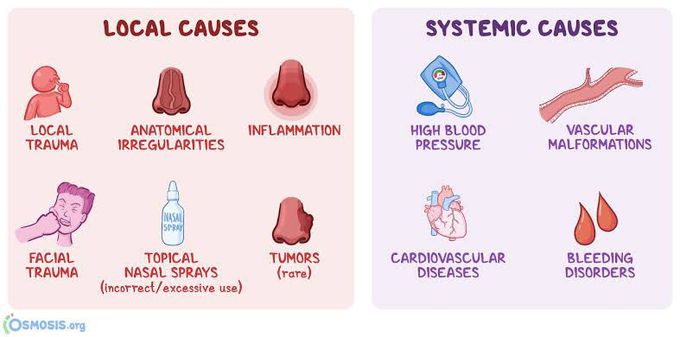


Causes of nose bleeding
Nosebleeds have many causes. Fortunately, most are not serious. The most common cause of nosebleeds is dry air. Dry air can be caused by hot, low-humidity climates or heated indoor air. Both environments cause the nasal membrane (the delicate tissue inside your nose) to dry out and become crusty or cracked and more likely to bleed when rubbed or picked or when blowing your nose. Other common causes of nosebleeds include: Nose picking. Colds (upper respiratory infections) and sinusitis, especially episodes that cause repeated sneezing, coughing and nose blowing. Blowing your nose with force. Inserting an object into your nose. Injury to the nose and/or face. Allergic and non-allergic rhinitis (inflammation of the nasal lining). Blood-thinning drugs (aspirin, non-steroidal anti-inflammatory drugs, warfarin, and others). Cocaine and other drugs inhaled through the nose. Chemical irritants (chemicals in cleaning supplies, chemical fumes at the workplace, other strong odors). High altitudes. The air is thinner (lack of oxygen) and drier as the altitude increases. Deviated septum (an abnormal shape of the wall that separates the two sides of the nose). Frequent use of nasal sprays and medications to treat itchy, runny or stuffy nose. These medications – antihistamines and decongestants – can dry out the nasal membranes. Other, less common causes of nosebleeds include: Alcohol use. Bleeding disorders, such as hemophilia or von Willebrand disease or leukemia. High blood pressure. Atherosclerosis. Facial and nasal surgery. Nasal tumors. Nasal polyps. Immune thrombocytopenia. Leukemia. Hereditary hemorrhagic telangiectasia. Pregnancy.
Best Probiotics For Womens 2025: Are They More Effective?Bitechchain Review - Is Bitechchain Scam Or legit?LipoFit Reviews - Dr Jennifer Ashton's Gelatin Caps for Weight Loss!MemoMeister Kapseln | BerlinPrestigio Marketdex Review - Can Beginners Profit With Prestigio Marketdex? Expert Insights

